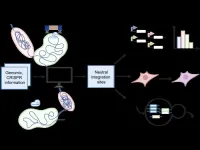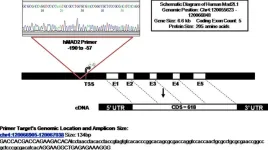(Press-News.org) Short and simple comments from ordinary social media users can help others online to spot fake news, a new study shows.
Research shows reading corrections from others online can reduce the perceived accuracy of and engagement with incorrect content.
Experts found the format and strength of corrective comments do not matter much. Social media users do not need to write long and detailed comments to flag false content.
While the study shows the general effectiveness of social correction, it also finds that miscorrections affect social media users as well: when user comments flag correct news as false, readers can perceive real news as less accurate. User comments may also cause further confusion on social media platforms.
The team carried out research with more than 6,600 people in the UK, Germany, and Italy (1,944 people in the UK, 2,467 in Italy and 2,210 in Germany). Respondents completed a task to assess false and true news posts on various topics such as health, climate change, and technology. The study used material that was posted on X (now Twitter), Instagram, and Facebook.
Researchers did not find evidence that more sophisticated corrective cues, such as corrective comments with links to fact-checking websites, were consistently and in a statistically significant way more effective than weak corrective cues, such as just a few words that flag a post as inaccurate.
The study, published in the journal Communications Psychology, was carried out by Florian Stoeckel, Chiara Ricchi and Jason Reifler from the University of Exeter, Sabrina Stöckli from the University of Zurich, Besir Ceka from Davidson College and Ben Lyons from the University of Utah.
Professor Stoeckel said: “Social corrections reduced perceived accuracy of and engagement with false news posts. We found people don’t need to write long corrective comments online when they want to flag a post as inaccurate. However, by consulting a fact-checking website before flagging a post as inaccurate, people can ensure that their correction is not in fact a miscorrection.”
“The simplicity of creating effective corrections can be a double-edged sword. Social media environments also include users that flag true news as false. While social corrections can be effective for false news, they may also undermine belief in true news. The findings that users can easily be affected by miscorrections emphasizes just how important digital media literacy is.”
END
Short corrective comments can help social media user to spot false information, study shows
2024-02-13
ELSE PRESS RELEASES FROM THIS DATE:
Biomarker-directed combination effective in immunotherapy-resistant lung cancer
2024-02-13
HOUSTON ― A specific combination of targeted therapy and immunotherapy may better help patients with non-small cell lung cancer (NSCLC) overcome inherent immune resistance and reinvigorate anti-tumor activity, according to a new study led by a researcher from The University of Texas MD Anderson Cancer Center.
Results from the Phase II umbrella HUDSON study, published today in Nature Medicine, demonstrated that the anti PD-L1 antibody, durvalumab, coupled with the ATR inhibitor, ceralasertib, provided the greatest clinical benefit of four combinations evaluated.
This pair had an objective response ...
Plant-based diet tied to improved sexual health in men treated for prostate cancer
2024-02-13
A diet that limits meat and dairy but is rich in fruits, vegetables, grains, and nuts is linked to less erectile dysfunction, urinary incontinence, and other common side effects seen in prostate cancer patients, a new study shows.
Led by researchers at NYU Grossman School of Medicine and Harvard T.H. Chan School of Public Health, the analysis of more than 3,500 men with prostate cancer explored whether eating a more plant-based diet was associated with quality-of-life issues that often arise after treatment. Sorting patients into five groups (quintiles) based on the proportion of plant versus animal foods the men said they eat, the authors found ...
Quality of care for patients who call 911 varies greatly across the United States, study finds
2024-02-13
Emergency medical service (EMS) systems are not consistently providing optimal care based on new national standards of quality to patients who call 911, according to a new study from the Icahn School of Medicine of Mount Sinai.
The study demonstrates that EMS performance on key clinical and patient safety measures varies widely across urban and rural communities. The findings, published in the peer-reviewed Prehospital Emergency Care, identify opportunities that could lead to improved care during 911 responses and improved outcomes for patients across the United States.
“EMS systems in the United States have traditionally relied ...
CRISPR-copies: New tool accelerates and optimizes genome editing
2024-02-13
CRISPR/Cas systems have undergone tremendous advancement in the past decade. These precise genome editing tools have applications ranging from transgenic crop development to gene therapy and beyond. And with their recent development of CRISPR-COPIES, researchers at the Center for Advanced Bioenergy and Bioproducts Innovation (CABBI) are further improving CRISPR’s versatility and ease of use.
“CRISPR-COPIES is a tool that can quickly identify appropriate chromosomal integration sites for genetic engineering in any organism,” said Huimin Zhao, CABBI Conversion Theme Leader ...
Teenagers need better reproductive health education to tackle parenthood fears
2024-02-13
Nearly half of teenagers are worried about having children and many lack knowledge about their reproductive health, find two new studies by UCL researchers.
The studies, published in Human Fertility and Health Education Journal, used survey results from 931 students in England aged 16 to 18, collected between May 2021 and July 2022.
The Human Fertility paper found that a majority of students (64%) still wanted to have children in the future – with nearly half (49%) desiring to have two children.
However, 45% of all participants said that they had concerns about future ...
Data-driven app results in 25% fewer emergency hospital admissions from care homes
2024-02-13
The use of a digital remote monitoring technology in care homes has been found to reduce hospital A&E attendances by 11% and emergency admissions by 25% in a new study from the Health Data Research UK (HDR UK) Better Care programme, published today in Age and Ageing - the official journal of the British Geriatrics Society.
There are over 400,000 people living in care homes across the UK, many of whom will be living with complex medical needs that put them at greater risk of needing emergency healthcare, especially during the winter months.
Through the HDR UK Better Care programme, a collaboration between the universities ...
In rural states, gardening and foraging helped prevent hunger during COVID: Study
2024-02-13
New research on rural New Englanders shows that gardening, hunting, fishing and other HWFP activities are important tools for maintaining food security through extreme events, such as pandemics or climate change events.
University of Vermont and University of Maine researchers found that both food insecurity and home and wild food production (HWFP) – gardening, hunting, fishing, foraging, and having “backyard” poultry or livestock – increased significantly during the COVID-19 pandemic, and those who undertook HWFP activities exhibited improved food security 9-12 months later.
The paper, published in Scientific Reports, surveyed ...
New study finds roughly 1 in 10 pregnant people will develop long COVID
2024-02-13
UNDER EMBARGO UNTIL: Feb. 12, 2024 5:45 p.m. Eastern Standard Time
Media Contacts: Karen Addis, APR, karen@addispr.com, +1 (301) 787-2394; Kerri Wade, MPA, kwade@smfm.org, +1 ...
Differential expression of Mad2 gene in human esophageal cancer
2024-02-12
“[...] people of the northeastern region [of India] consume betel quid, consisting of raw areca nut [...]. People often swallow the entire betel-quid after chewing, which is believed to contribute to the development of oral, esophageal, and gastric cancers.”
BUFFALO, NY- February 12, 2024 – A new research paper was published in Oncotarget's Volume 15 on February 5, 2024, entitled, “Differential expression of Mad2 gene is consequential to the patterns of histone H3 post-translational modifications in its promoter region in human esophageal ...
RIT's Center for Detectors to work on two NASA projects
2024-02-12
Rochester Institute of Technology’s Center for Detectors has been chosen by NASA for two research programs: Early Stage Innovations (ESI) and Strategic Astrophysics Technology (SAT), with the hope of helping future spacecraft find new discoveries in the vast universe.
Under the leadership of Center for Detectors Director Don Figer, the team will be advancing and characterizing single-photon sensing complementary metal-oxide semiconductor (CMOS) image sensors to determine if they can survive the harsh radiation environments in NASA missions. The intent is to fly these types of detectors on future missions to find life on Jupiter’s ...



